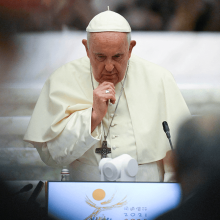IDF
Honestly, I never thought much about Israel before college. Then, during my sophomore year, a prominent New Testament studies scholar had been invited to speak on campus; after it came to light that they were openly critical of the state of Israel, they were summarily disinvited. A few other students and I were still able to meet with the scholar, and we were shocked by the language they were using to describe the conditions in Israel for the Palestinians: “Second-class citizens,” “genocide,” and “apartheid” were the terms that struck me most.
“It can’t be as bad as what Black people have faced in the United States or what they faced in South Africa,” I remember saying to the scholar. “Go and see,” they admonished. And so, one year later, that’s exactly what I did.
“They will not hurt or destroy on all my holy mountain...” —Isaiah 11:9
Pope Francis called for an end to attacks and violence in Israel and Gaza on Sunday, saying terrorism and war would not solve any problems, but only bring further suffering and death to innocent people.
PALESTINIAN AMERICAN JOURNALIST Shireen Abu Akleh was shot and killed in May 2022 while covering an Israel Defense Forces raid on a refugee camp in the Palestinian West Bank village of Jenin. Abu Akleh had been standing with a group of other journalists and was wearing a blue vest with the word PRESS printed across it when she was shot; her producer was shot in the back but survived. Hours after Abu Akleh’s death, Israeli police went into her home, took away Palestinian flags, and prevented the singing of Palestinian nationalist songs.
In mid-November, the FBI opened an investigation into Abu Akleh’s death; Israeli Defense Minister Benny Gantz said Israel would refuse to cooperate since, Gantz said, the IDF had already investigated the IDF actions in the shooting. The U.S. State Department commented, “Not only was Shireen an American citizen, she was a fearless reporter whose journalism and pursuit of truth earned her the respect of audiences around the world.”
Before her death, households throughout the Arab world knew Abu Akleh’s work. Nicknamed “the daughter of Palestine” — and “the voice of Palestine” — Abu Akleh had worked for Qatar-based news outlet Al Jazeera for a quarter century. Viewed as courageous and thoughtful, Abu Akleh inspired many, including women interested in pursuing a career in journalism in the Middle East. A common signoff for her broadcasts summarized her motivation for being a journalist: “I chose journalism to be close to people. It might not be easy to change the reality, but at least I can bring their voices to the world. I am Shireen Abu Akleh.”
Violence in the Gaza Strip has been raging for more than two months, with more than 115 casualties in the "Great March of Return" protests organized by Hamas, a militant group that controls Gaza. Since the end of March, Palestinians have been protesting to shed light on on the Israeli-Egyptian blockade on Gaza, and also call for the “right of return” for Palestinian refugees displaced since the 1948 war.
What a relief it would be to dwell in [faith] communities where we acknowledge our shadows in a healthy acceptance of ourselves as containers of all the opposites! It may prove beneficial to be forced to face, daily, the humiliating fact that some of us are no less violent than those whose policies we oppose.
—Walter Wink, Engaging the Powers
I AM A conscientious objector, and I am drawn to violence. My attraction to violence is both innate and learned. When something frightens me, my hands clench into fists. When something angers me, I want to inflict pain upon that thing. But a person cannot inflict pain upon a thing, so I seek out those whom I deem responsible for said thing and my desire to inflict pain upon a thing morphs into a desire to do violence to another person. Since I was a child, I have fantasized about using violence to stop what I see as bad and thereby become good.
It is from this point—from these fantasies of righteous violence—that I begin this essay on my journey to principled nonviolence and conscientious objection. This is a story of change and choice, but it is not a story of transformation: I am who I have always been.
In fall 2012, I spent three weeks in Israeli military prison for refusing to enlist in the Israel Defense Forces. (Every Israeli citizen, except for the ultra-Orthodox and Palestinian citizens of Israel, must serve in the military.) My sentence was brief, but the process that brought me to the prison’s gates took almost a decade.




